Universal heating boilers: how to combine different types of
Universal heating boilers are devices that use different types of fuel. The use of such products can significantly reduce the risks in arranging the heating system at home, as well as reduce heating costs due to the choice of a particular fuel.
In our article we will talk about the main types of such boilers, as well as analyze their strengths and weaknesses.
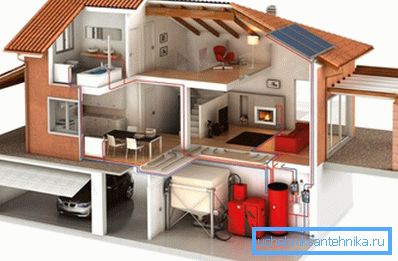
Varieties of combined heaters
Gas-diesel devices
A universal heating boiler, which can burn like gas, that and diesel, is in some way a paradoxical device.
And yet such a combination of cheap and quite expensive fuel is fully justified:
- Structural schemes of gas and diesel heating boilers differ minimally: to switch to another fuel it is enough to install an appropriate burner with your own hands.
- Reconfiguration of the device is also not difficult, even for a non-professional, so that when you turn off the gas, you can quickly switch to another mode of operation.
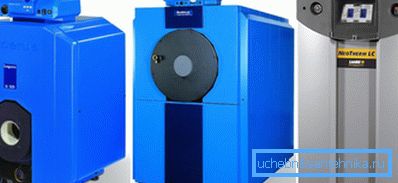
Note! Despite the fact that the instructions for replacing the burner is quite simple, and the transition from gas to diesel and vice versa can be carried out independently, it is better to trust this task to service representatives. In this case, we can be sure that everything will be done correctly, and the risk of fire or leakage will be excluded.
- The power of the device also does not depend on the selected fuel, because the device can effectively heat the house in any case.
Most often, such universal models are installed in homes, which is called “with an eye” for future gasification. In this case, it is possible to use diesel fuel for several months and then switch to gas without serious consequences.
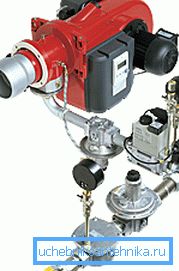
Firewood and gas models
The heating universal boiler, which can use both gas and solid fuel, is also very productive:
- First of all, so we get the opportunity to choose which fuel to purchase. There is a possibility - we burn cheap firewood, or coal, no - we switch to gas.
Note! This is especially convenient in regions where wood from the surrounding forests is supplied almost free of charge.
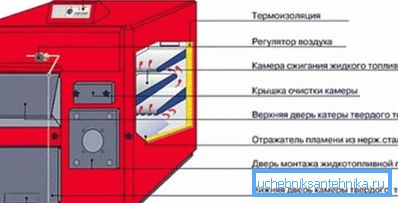
- Secondly, Many models of such devices can also be equipped with a liquid-fuel burner, so that we will have an almost “omnivorous” apparatus, for the operation of which any combustible material can be used.
- On the other hand, the gas-diesel part of this unit is still optional, i.e. it cannot provide full power realization. Yes, and set up the system is quite difficult, for that matter, any solid fuel boiler.
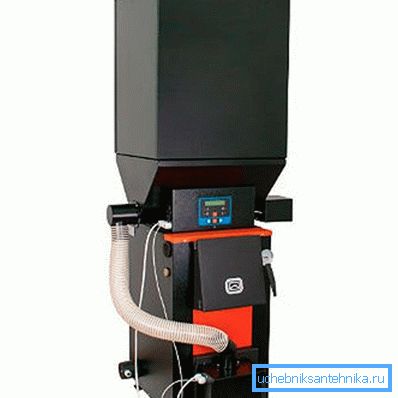
And yet for a country house, where the main type of fuel is firewood, pellets or coal, and gas is just one of the additional options, such a device will be more than suitable.
Electric boiler with gas burner
In some cases, gas units for heating systems are additionally completed with electric boilers or electrode systems. Of course, the power of such modules is clearly insufficient for proper heating, and the price of electricity is too high to use it as an alternative to gas. So what's the point of implementing such a configuration?
In fact, everything is quite logical:
- In the summer, when the heating equipment is used as a water heater, the electrical part is operated. It is easier to maintain and configure, and most importantly - more secure.
Note! An additional advantage would be an increase in the resource of the gas burner and heat exchangers due to interruptions in operation.
- In winter, the electrical part is turned off. It is used only during interruptions in gas supply and during long absences, accompanied by the shutdown of the boiler. A boiler operating in an economical mode helps to maintain the minimum allowable temperature of the water in the pipes, and does not allow it to freeze.
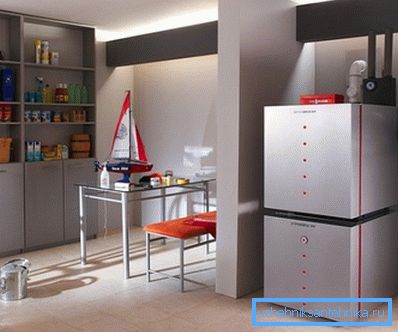
Of course, other options for combining different systems are possible, but they are used relatively rarely.
Pros and cons of universal solutions
Systematizing the above information, we will try to highlight the main advantages and disadvantages of boilers that use different types of fuel.
The strengths of such combined structures should include:
- The possibility of transition from one fuel to another, depending on its availability, as well as in accordance with the dynamics of prices in the market.
- High autonomy of the system, independence from the work of gas pipelines and power lines.
- The availability of alternative modes for summer time, as well as the possibility of shutting down the system in the winter without the risk of freezing of the coolant.
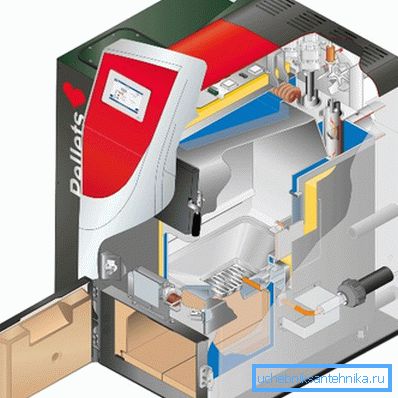
On the other hand, there is a similar solution and disadvantages:
- First of all, the cost of equipment for multi-fuel heating will be higher than with the purchase of specialized models.
- Secondly, Combined boilers are somewhat less reliable, and have a reduced service life. And the point here is not in the quality of performance - just in such devices there are more complex parts, prone to breakage.
- Finally, the capacity of the boiler may differ depending on the type of fuel used, therefore it cannot be considered as fully universal such a system.. In any case, one type of fuel will be the main, and the rest will perform auxiliary functions.
Of course, these shortcomings are not an obstacle when boilers are involved in the arrangement of heating systems, but they must be kept in mind.
Conclusion
Universal heating boilers are very convenient to use, however, and the limitations associated with their work, also do not forget. If you are determined to purchase such a device, we recommend that you carefully study the above descriptions, as well as view the video presented in the article. The information obtained will help you make the right choice!